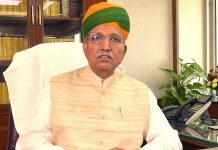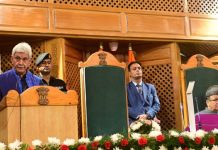
Launched in 2018 in Keonjhar and Mayurbhanj districts of Odisha, the USAID-funded Samvad project helped spread awareness among rural women on nutrition, institutional delivery and child care, writes DEEPANWITA GITA NIYOGI
Sumi Naik, a resident of Podiabeda in Odisha’s Mayurbhanj district, is the mother of three young daughters. Her youngest child is about a year old. During an afternoon interaction with other women, Naik said targeted videos have helped her learn how to take care of children in the 0-6 age group and the need to adopt family planning measures.
Project Samvad, an integrated approach launched in July 2018 relied on video-based approach to focus on maternal and child health. Funded by USAID, the project which concluded in August in Keonjhar and Mayurbhanj districts of Odisha, targeted the critical 1,000-day period. Short videos produced under Samvad, as part of a joint effort by global organisation Digital Green and state-based non-profit Centre for Youth and Social Development (CYSD), also spread awareness about anaemia and malnutrition.
“For dissemination of videos at the community level, 1,731 women self-help groups were roped in. Community service providers or CSPs were chosen for spreading the word. During lockdown, Whatsapp groups were formed for showing the videos as social gatherings could not be allowed due to Covid-19 restrictions,” Hrudananda Senapati, Samvad project coordinator from CYSD, said.
Acting as volunteers for Samvad, CSPs helped in data collection in the project villages. One CSP took up the responsibility of looking after three to four villages. A total of 174 villages were covered as part of Samvad across 25 gram panchayats in Keonjhar and Mayurbhanj. The number of households covered stood at 23,231.

Spreading the word
Anganwadi worker Pushpalata Sirka from Badaposi village of Keonjhar has been there for four years. “When we started, there were multiple problems in the village. Malnutrition was common; people stigmatised family planning and women refused to take iron tablets during pregnancy. They wrongly thought that tablets will cause the baby to grow in size inside the womb and lead to caesarean delivery,” she said. Sirka explained that to remove such misconceptions, videos were shown to women in groups and then follow-ups happened through home visits.
The videos ranging from 8-10 minutes in length relied on local actors to spread the message. As women started watching the videos along with their family members, discussions started taking place in all the four women groups in Badaposi. “At first, the videos were shown through projectors at specific locations in the villages. After that, CSPs visited individual households to find to what extent women adopted the practices shown in them,” Senapati added. Besides maternal and child health, Samvad also laid stress on institutional delivery.
However, Covid-19 brought in its wake many challenges. Due to restrictions in movement, the numbers of smartphone holders were collected for dissemination through Whatsapp. Families having normal phones relied on CSP visits or listened through audio messages by dialling a number. But formation of Whatsapp groups was a challenge due as many families do not have such facilities. In Badaposi, only 12 families have smartphones.
In Damahuda gram panchayat of Keonjhar, anganwadi worker Mili Marandi said programmes on maternal and child nutrition, exclusive breastfeeding and immunisation are regularly organised in anganwadis. “Earlier, women used to be late for pregnancy registration which should be done within two months. Now, they come for regular check-ups. We also celebrate village health and nutrition day as well as vaccination day,” Marandi added.
CSP Labangalata Mahanta from Podiabeda said infant mortality rate as well as maternal mortality rate was high in many villages. Husbands and in-laws were not supportive towards women. Either registration did not happen at all or took place late. Due to the lack of awareness, pregnant women used to throw away iron tablets. Now, they take these tablets regularly after seeing the videos. In a village called Baliposi in Keonjhar, CSP Damayanti Mahanta and ASHA worker Bindubati Behera informed that it was difficult to spot pregnant women as they did not come for registration on time.

Positive outcomes
CSP Timira Jyotsna Barik who looks after Goras village in Keonjhar, said Samvad videos have helped increase registration at anganwadis. The most positive impact has been the acceptance of iron tablets by women, she added.
As sometimes houses lie scattered in many villages, bringing women together at a dissemination point sometimes proved to be difficult. So, anganwadi centres were used for dissemination. Besides increased activity at anganwadi centres, women and their families realised many thing need to be kept in mind during pregnancy. One was that heavy weight should not be lifted.
After watching videos on hygiene, family planning and the importance of 1,000 days, several beneficiaries have benefitted a lot. They have also held discussions with husbands and in-laws on family planning, importance of hygiene and dietary diversity during pregnancy.
A woman from Chadeibhol village in Keonjhar, Hemlata Soren, inserted copper-T after in her womb after giving birth to two daughters aged three and six. Watching a video on family planning helped her in this. Shibani Champia, the sarpanch Damahuda panchayat, said there has been a positive impact of Samvad in the villages.
The main aim was to make women watch the videos and initiate dialogue within families. Community service providers helped spread awareness on important topics. Badaposi residents Surumuni Chatar, Sumitra Jerai and Vijayta Purti not only continue watching the videos through Whatsapp, but also remember what all were shown previously.
After the second wave of Covid-19, one of the initial videos made on the importance of hand washing with soap and water was again sent for viewership through Whatsapp.
tehelkaletters@gmail.com













